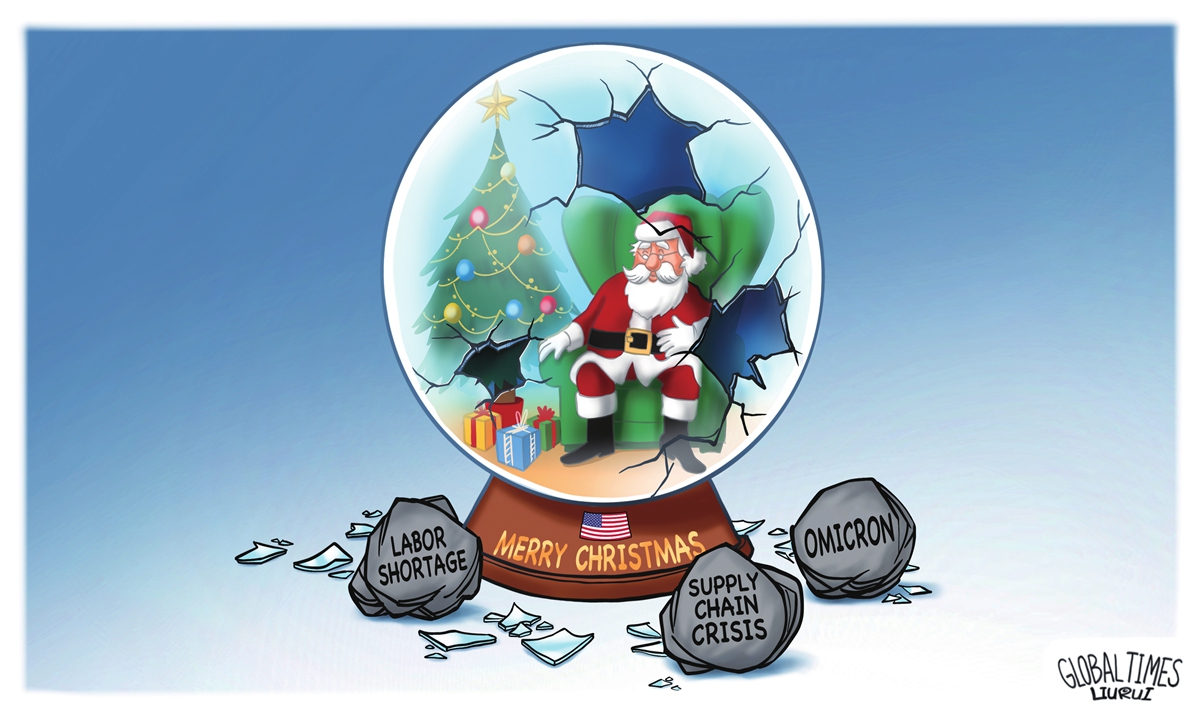
A gloomy Christmas Illustration: Liu Rui/GT
With Christmas just around the corner, holiday shopping traffic in the US did not explode as expected during the "Super Saturday," which is usually one of the busiest shopping days of the year in the US. Meanwhile, in China, a livestreamer was fined 1.34 billion yuan ($210 million) for tax evasion, a record number that reflects China's consumption power.
The two major economic news revealed differences between the economic structures of China and the US and offered clues about their respective growth prospects in the post-pandemic era.
US retail traffic dropped 26.3 percent on Saturday compared with the Saturday before Christmas in 2019, CNBC reported, citing preliminary data from Sensormatic Solutions, a data firm that measures store visits. Even in the weeks ahead of Christmas, visits to retailers were much lower compared with the corresponding weeks in 2019, according to media reports.
The declining enthusiasm among US shoppers reflects worrying signs about the Christmas sales season. Experts had expected more consumers to opt to shop in physical stores as Christmas approached due to delivery delays of online shopping, but the data tells another story, which may be because of the concerns over the highly contagious Omicron variant.
Still, there are optimistic forecasts for Christmas sales season. The US National Retail Federation projected that spending in November and December could grow as much as 11.5 percent compared with the same period last year. Even if that turns out to be correct, many fret that the higher-than-normal inflation may be the real reason behind the expected spike in spending.
But broadly speaking, uncertainties over US consumption underscore a series of economic woes faced by the US, including runaway inflation, supply chain crunch, and various business disruptions caused by surging COVID-19 cases.
On the other side of the Pacific, an item of consumption-related news was in the spotlight in the Chinese media this week. China's top livestreamer Huang Wei, nicknamed Viya, was fined 1.34 billion yuan ($210 million) for tax evasion by taxation authorities. The record fine imposed on a livestreamer raised eyebrows across the country's nascent livestreaming economy, which, to a certain extent, reflects the consumption strength of Chinese consumers.
The new business model behind China's livestreaming industry is not just about China's digital economic strength, but also the country's manufacturing strength and mature logistics infrastructure, two of the most enviable parts of China's resilient supply chain that buttressed the economy's recovery from COVID-19.
A flexible digital economy, a strong manufacturing foundation and efficient delivery services together constitute one of the bright spots in China's domestic consumption. This is where the future development potential of the Chinese economy lies. With such consumption momentum, Western media claims such as "slow meltdown of the Chinese economy" will only be nothing hype.
Chinese and US consumption figures show the resilience of China's consumption power. According to the US Census Bureau, retail and food services sales stood at $639.8 billion in November. During the same month, China's retail sales of consumption goods totaled around 4.1 trillion yuan.
While the two figures are based on different statistical criteria, it is clear that China is already one of the world's largest consumer markets that may likely unleash more consumption potential in the future and remains on a firm path to surpass the US to become the world's largest biggest consumer market.




